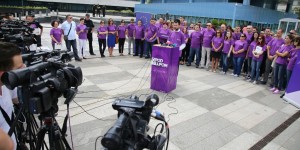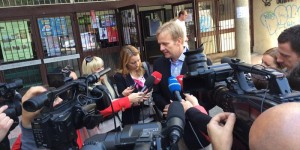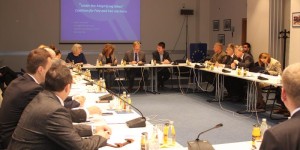Brussels, 11 October 2018
Check against delivery!
Thank you very much. Your [Mairead McGuinness, First Vice-President of the European Parliament] kind words are really touching and I would like to thank you, personally, for the way in which you chair the Plenary – it does make a difference – and also to thank you and all the colleagues here from the European Parliament, from the national parliaments, from the African parliaments and from civil society organisations and all of you here today for this conference.
I was really sorry for not being here for the opening of the conference, but it was for me a priority to be present at least at the closing of it and my colleagues in the External [Action] Service of the European Union have briefed me on how these two days of work have been productive and I am particularly glad that we worked so well and so intensively together in these two days. This is a good basis for continuing our common work, because I fully share: the best is yet to come, implementation will be the key.
I would like to particularly thank the European Parliament for a really excellent cooperation in preparing this conference. But it is a cooperation that extends well beyond the room we are in today – I understand a bigger room than foreseen, which I take as an excellent sign of attention, motivation and determination to continue our work.
Our cooperation with the European Parliament is the cornerstone of the success of our Electoral Observation. It is now 18 years since the first mission led by a Member of the European Parliament took place as a chief observer. In these 18 years our cooperation has extended well beyond the European institutions.
Again, let me make just one example: you mentioned the doctorate I was honoured to receive yesterday in Tampere, but then in the evening I moved to Helsinki where I spent the evening celebrating the 10th anniversary of the Nobel Peace Prize given to [former] President [of Finland, Martti] Ahtisaari and that was a Nobel Peace Prize given for his work on peace and mediation in different parts of the world. One of his greatest successes was the peace process in Aceh, Indonesia, and he was involved as a mediator, not in an institutional capacity, but with his civil society organisation, the Crisis Management Initiative. The European Union, at that occasion, did not just support the mediation, but when the agreement was reached, we sent a civilian mission to monitor disarmament and, together with the Parliament, we sent an Electoral Observation Mission to follow the first vote that took place after the deal. Then, we added, as European Union, our economic support for reconstruction and recovery.
I give this example at the outset to explain what I see as the European way to peace and security in action. Electoral Observation is a central part of it, as much as cooperation between European institutions and civil society organisations that work in mediation, including to address the risks of electoral violence. Our common work extends to local authorities, other donors, regional organisations, and I mention here the African Union, the OSCE [Organisation for Security and Cooperation in Europe], UN agencies and election assistance organisations in supporting the implementation of the recommendations of our observers’ missions, which is, I believe, a key element you have also been discussing in these days.
In this cooperation, I know we can always count on the impartiality, independence and professionalism of our observers. This is our credibility. Our agenda, when we engage in an Electoral Observation Mission, is to guarantee human rights, to support democracy – that is, indeed, the engine for development – to accompany a peace process, in some cases. I want to be very clear and straightforward: our goal is never to take sides in local or national or domestic politics or express our own views – never, never. I often say we do not even do this when it comes to our own Member States, imagine if we did this outside of the European Union.
Our work is aimed at achieving one result: that local people, citizens, can truly express their own views and take the future of the country in their hands. This is the only objective we have. Deploying a mission is never a decision we take to please our partners – I will be very open on this as well. They are not necessarily pleased also with the assessment we make, but we need to keep the autonomy, the independence and the objective approach that makes it credible.
We are not there to send in missions as fig leafs. If our partners are asking us for support in their quest for democracy, then we are there to help, yes. If they are seeking for legitimisation of rigged elections, we are not the right ones to call. Sorry, I am being very blunt, but I think it is the fair recognition of the quality of your work. I say so, because often before taking the decision of deploying an Electoral Observation Mission, all these arguments come on my table – on our table – and I think it is fair to put it as transparently as possible why we sometimes decide to deploy and why we sometimes decide not to deploy an Observation Mission.
When we decide to step in it is because we believe that our observers can make a positive difference through their presence and their work. They do make a positive difference, not only by providing an impartial assessment, sometimes in difficult contexts, sometimes even in personal difficult contexts, but increasingly by issuing recommendations and investing in the follow-up to election day. Because we know very well that election day is only the tip of the iceberg; democracy is the daily exercise that goes well beyond the ballot box. It is about equal rights for all voters and a level playing field for all parties. It is about freedom of speech with diverse and independent media. It is about a lively civil society and the daily participation of citizens from all backgrounds to a country’s public life.
Our missions represent a contribution to all of this and to improving the overall quality of each democracy in full respect. Often they are part of a larger good human rights story as we have started to call them. You might know, just a couple of weeks ago we were in New York for the UN General Assembly, and together with Antonio Guterres and Michelle Bachelet as well as with 13 countries from all over the world, we presented a new initiative as European Union called precisely Good Human Rights Stories. We wanted to show that human rights is not only a fight we need to take but also brings good results that work and that there are positive stories that come out of the work we are doing in human rights. Now, you will be asking, what does this has to do with Electoral Observation Missions: it does a lot; Electoral Observation can often turn into a good story on human rights.
I would just mention one example, the Gambia, where local people together with their neighbours managed to end a long era of repression through peaceful means. I remember personally the night telephone calls that we had around the time of the transition, not only with our friends from the Gambia, but also from our friends from the region and from the African Union. We sent our observers precisely to accompany the country on the path towards a full and inclusive democracy.
Electoral Observation is also part of successful transitions and successful human rights stories. We organised together this conference also to make a contribution to the future of Electoral Observation. I understand that through your discussions over these two days, you have, we have taken some important steps forward. I am particularly glad for the work with the United Nations and the African Union on Electoral Observation and its follow-up. This is yet – I believe – another demonstration of the huge powerful potential of our new trilateral cooperation that is a truly innovative experiment in effective multilateralism. We have launched it in particular at the margins of the Abidjan Summit between the European Union and the African Union, and we even met in New York a couple of weeks ago.
We have taken some important steps forward, such as the agreement of the code of conduct between parliamentary observers, but also on digital systems and on tackling disinformation campaigns. I am also glad that civil society organisations, dealing with mediation have been with us in these two days. On the one hand, Electoral Observers have a public role but their mandate prevents them from active mediation, and on the other hand, you have NGOs who can play a role in the prevention and mediation of violence but who are not in a position to assess the outcome of an election that has generated violence. So, cooperation between us is absolutely essential.
Coming today to the Conference, I was thinking that our story started almost 20 years ago with a mission to Zimbabwe, and our very latest engagement was again in Zimbabwe. Our mission led by my good friend and colleague Elmar Brok was the topical moment of a broader engagement, together with the broader international community, to allow for credible elections in the face of substantial challenges. It was a challenging mission, the sign that the path towards a full and functioning democracy is not always easy. Actually, I cannot think of one case in which it is easy, but democracy is always a work in progress and you see progress while you work, and this is what keeps us going.
There may be setbacks, there may be obstacles on the way, there are almost always and everything that was achieved in the past has to constantly be reconfirmed by every new generation, by each of us every single day. But positive change does happen, and I believe is happening, at all corners of the world even if it is sometimes difficult to see it because the international environment is rather chaotic and conflictual these days. But if you focus on the small/big stories, you see progress happening everywhere in the world.
Change needs us; it needs the European Union, the African Union, all our partners in this room, it needs Parliaments, the European and the national ones. It needs us to first of all never get tired when we face setbacks and we do face setbacks but I think that lesson number one is perseverance, stubbornness and continuing the work along the principles and the guidance we have. Continue working for tomorrow to be better than today – ultimately this is what electoral observation is all about. Better democracies that truly give the power to those it belongs to, which is each and every citizens.
I thank you very much not only for the attention but also for the work you have done in these two days, in the previous months and years and for the work that is still to come. Thank you very much.



